- Home
- Peter Rimmer
Vultures in the Wind
Vultures in the Wind Read online
Vultures in the Wind
Peter Rimmer
Contents
Book One
Chapter 1
Chapter 2
Chapter 3
Book Two
Chapter 1
Chapter 2
Chapter 3
Book Three
Chapter 1
Chapter 2
Chapter 3
Book Four
Chapter 1
Chapter 2
Chapter 3
Book Five
Chapter 1
Chapter 2
Chapter 3
Book Six
Chapter 1
Chapter 2
Chapter 3
Epilogue
Dear Reader
Principal Characters
Glossary
Acronyms
About Peter Rimmer
Also by Peter Rimmer
Book One
1
Green pigeons burst from the wild fig tree and wheeled away up river, frightened by the newborn cry. When the flock of birds drew level with the kraal, a second cry made them wheel again to fly back towards the sea, over the banana trees, where they cut the beach before returning to the fig tree and the feast of ripe fruit. The birdsong in the valley mingled with the chatter of monkeys and the sound of surf rolling to the shore. From the Mbeki kraal, the smoke from the cooling fire rose straight to the powder blue sky.
There was peace in paradise, food in the sea and fruit on the trees, and the news spread from the woodsman’s hut to the kraal and from the kraal to the hut that men-children had been born. It was a day of great celebration and joy. They called the white boy Matthew Gray and the black boy Luke Mbeki and the families joined together to drink the thick white beer brewed from the maize corn. The harmony was tangible. Robert Gray spoke English to his wife Isalin, but Xhosa to Sipho Mbeki and Namusa his wife.
That afternoon, from the sea, Robert brought a big fat copper steenbras that he had caught from his boat and they made the fire on the beach, beside the banana trees that came to the edge of the sand, and the great fish was cooked for the families. Robert and Isalin opened slipper oysters and laid them out on trays, dropping mauve petals from the bougainvillea between the gaping, pearl-coloured shells. Sipho found a small black pearl in his oyster and luck was with them again. Bananas, mangoes, peanuts and avocado pears, filled with cooked mussel, were eaten in great quantities and, when the ball of red fire dipped behind the hills, it spread a glow of fire under the belly of heaven.
The children played in the gentle surf and the fish plopped in the river that spilled into the sea. Luke and Matthew were put next to each other under the fronds of the banana trees and their mothers fed them. Robert walked the long beach with Sipho and watched the moon rise from the sea to the right of the Gap where God had left the cliff and tipped a piece half into the sea. Behind them, the sunset was rich as blood. The men were tall and lean with the long strides of the well content. It had not always been so peaceful for Robert Gray.
In 1929, when the values of the world’s shares were being adjusted downwards on an hourly basis, Robert had been a forester at Diepwalle, many kilometres to the west. Five days after that Black Monday at Wall Street in October, he had risen at dawn and found the chief forester beating a black man around the head with a heavy piece of wood. He had taken violent measures to retrieve the weapon, making Piet Van der Walt turn his attention to his young forester.
“The bastard’s a thief,” said the Afrikaner, in the tongue they were now calling Afrikaans.
“I stole nothing, Baas,” wailed the battered black man, as Robert’s superior took a heavy swing at Robert’s head.
Van der Walt growled, “You should mind your own business, Gray,” and, as he bent to pick up the fallen log, Robert brought his knee up into the man’s face. The two white men fought for less than a minute but it was enough to destroy Robert’s career with the department of forestry. That afternoon he left Diepwalle for an uncertain future with Van der Walt’s now quiet voice still playing through his mind.
As he walked the sixteen kilometres into Knysna, the giant yellow-woods mocked his progress. “You will never work again in forestry, Gray. Mark my words.” The fact that the real thief had been found at lunchtime meant nothing. If the chief forester wished to batter one of his black workers with a metre-long piece of wood, it was the chief forester’s prerogative, and most likely the man would work better. That was how they thought at Diepwalle.
There was no work in Knysna, so Robert shifted off up the coast. He was a twenty-three year-old graduate of the University of Cape Town with a degree in forestry, something else Van der Walt had not liked about Robert Gray. He had moved progressively farther up the coast, feeding himself from the sea and the local vegetation. After a month, he was enjoying himself and the small backpack that carried his all was as light as a feather.
He arrived in Port St Johns six months later, and then walked back from First Beach the five kilometres to Second Beach, to the mouth of the smaller river where the sea and river fishing were good, the bananas plentiful and the only two brick-built houses empty of people. Deeper in the forest he met Sipho Mbeki, whose kraal was sheltered amongst the trees and whose pigs, cattle and chickens roamed the forest. The black man had a flock of noisy geese down by the river and a dog that growled at Robert. He also had two wives and many children. In Xhosa they discussed the weather and this year’s piglets and last year’s piglets and the small banana crop. After three hours of sitting on his haunches, Robert came to the point.
“Who owns the brick houses with the green roofs?”
“Baas Todd in Johannesburg.”
This was how the Gray family first became aware of the Todd family. It would be some time before the Todd family visited, as they only came down on holiday in December.
“You think I can build myself a hut?”
“Every man has the right to build a hut.” It was the African tradition.
The work took Robert three months as he had to borrow the tools in the village of Port St Johns and buy wood and nails with the last of his forester’s wages. The corner poles he cut from the forest and the roof he thatched with grass. The front of the hut was a long veranda, so even in driving rain the bedroom and lounge were dry. On cold nights he burnt driftwood in the open fireplace, the only part of the hut that was built of brick. In exchange for a fourteen kilogram Cape salmon, the local butcher gave him a hammock which he hung on the veranda for watching the beach and the sea. Very quietly, Robert drifted into the daily lives of the Mbekis. He was the only permanent white man at Second Beach. For Robert, there was nowhere more wonderful on earth.
Isalin Metcalf came to Port St Johns to paint. She had a fine arts degree from the University of Witwatersrand, and a boyfriend in the establishment who wanted her to settle down and have his babies and live in a fine house in Sandown, ride horses, give dinner parties and look decorative, while he carried on making piles of money in ‘the big J’, Johannesburg. Even the Depression had not dulled his wits, as when the crash came he was liquid and left selling short into a tumbling market.
The only snag with the boyfriend was that he talked about nothing but money. He even patronised her painting in public, as if he were bringing out the family dog to play tricks. It never once crossed his mind that she was serious about her painting and, when she persuaded her father to give her a year at the coast, to hold an exhibition on her return and let the public decide, he thought she would be back in the big city within a week. He fancied Isalin as much for her heavy breasts, strong, child-bearing hips and long, lean legs as he did for the whiff of rumour that her great-grandfather was a Scottish earl and the blood of kings ran
in her veins. The boyfriend was also a snob.
Her work could be described as exotic paintings of the jungle with lots of tropical foliage and animals, small and large that hid among the trees. Her colours were soft pastels and the canvases big, but best of all she had the third dimension. Her art teacher had known what he was doing.
She rented a small house across the big river mouth from the First Beach and took the ferry boat to the village for provisions. She was prepared to be a recluse for her art, to prove that there was more to life than parties and selling shares short on the stock exchange. She wanted something of her own; to create something, to say something, to let the longings and passions inside her come out on the canvas and take shape that other people could see. She desperately wanted other people to feel the same way that she felt about beauty and nature and all the animals and birds on God’s earth. She wanted to say it all in colour, to shout it in colour. She wanted to shout how wonderful life was through her paintings.
To be a painter, she grew her blonde hair long and hung it on one side of her face with a flower, and wore long skirts with sandals and wrap-around tops that she made herself. She tanned nude and her body was firm and ripe. She had never been penetrated and, though the longing was there, she refrained. There was a beach hidden among rocks down from her house on the cliff that let her swim naked and feel the warm salt water all over her body. She went across in the rowing boat twice a week as food went off in the heat and, with all the sea and sun and the burning energy that made her paint whenever the light was good enough, she was always hungry. She cooked big feasts for herself at night, pretended she had company and hugged herself with pleasure.
She had been on the Wild Coast for three months before she saw Robert Gray, who was now wearing hair as long as hers. He also had a beard, shoulders as broad as a woodcutter’s and a tan so deep that, were it not for the penetrating blue eyes twinkling among all the hair, she would have thought him more local than he was, even more a part of the tropical Africa.
The sight of him striding down the road near the shops caught her instant attention. He was magnificent, wearing a colourful home-made shirt and shorts, no shoes, and a curved pipe in his mouth which he removed to greet everyone he saw with a “Beautiful day.”
She was not close enough to hear whether he was humming, but his body language sang with a song, and she fell in love from across the street. Her legs would not work and she thought her heart stopped. When the blue eyes played into her soul, she took hold of the jacaranda tree and hung there, hooked like a fish.
“You must be the painter?” he called.
“Yes,” she replied, without sound.
“May I come and look at them?”
“Yes,” she squeaked.
They became lovers that night, and were destined never to spend a day apart for as long as they lived in Port St Johns, until the war in the desert took him away from her forever.
David Todd had made more money in twenty years than most men dreamt about. He had founded his insurance company in 1910, shortly after the Union of South Africa was created from the belligerence of the Boer War. He had privately placed three-hundred shares of five-hundred pounds each with friends and relations, whom he talked into in the same way that he had sold insurance for Prudential.
For five years he had been their most successful salesman, working on the principle that, if he did not sell his prospect a policy and force him to save, the man would drink the money and the man’s family would suffer terrible consequences. He was one of the few insurance salesmen who really believed in his product, not simply the first year’s premium he earned in commission. With the new company he formed, he installed into his sales force the same belief, and the funds poured into his company. Because his mind was set on security, the company invested only in the old-established mining-houses and property, the first being Security Life’s building in the fast-growing Johannesburg.
Within ten years and despite the fact that he spent two years in France and was one of the few South Africans to walk out of Deville Wood undamaged, his original thirty shareholders were all rich from their one investment and David Todd was looking to expand into England. This was a remarkable reversal of the normal trend in the insurance industry, which saw British companies taking huge profits out of South Africa, the benefit of a good colonial system. By the time he came down to Port St Johns with his large family for their annual holiday in 1930, he had avoided the pitfalls of the stock-market crash for his policyholders, and his endowment policies in Africa and Europe were showing a fine return on the policyholders’ investments.
The family arrived in convoy, with the house servants and nurses for the younger children. Each of the children brought a friend, and the noise when they decanted from an assortment of shooting brakes was formidable, though they were all glad the journey was over. The road through the hills to the coast was terrible, but it gave David Todd once a year the seclusion he craved from his business. There were no telephones at Second Beach and if anyone wanted to talk to him he had to drive down and back again. He offered neither shelter nor nourishment, so generally he was left alone with his family for what he considered the most important six weeks of his year.
“Daddy, there’s a new hut behind the cottage,” chorused his children, soon after the main house had been opened up and he was sitting on his veranda marvelling at the sheer beauty of the scenery.
“A new hut! Where?” He put down his second cup of tea and was dragged by the hand to view Robert’s hut. Isalin looked up from her painting to see six children and a man staring at her. She had heard the cars and came to the right conclusion.
“Hello; you must be Mister Todd. I’m Isalin Gray. Sipho told us all about you. Robert’s fishing.” The man was giving her a queer look, but did not come any nearer. “Robert, my husband. We got married last week. No, here he comes. Robert! This is the nice Mister Todd, Sipho and Namusa talked about.”
“Robert Gray. Ex-forester. Now beachcomber and fisherman,” said Robert, by way of introduction. “I built the house myself,” he went on, following the stare of the man and the children.
“You’ve built it on my land,” said David Todd.
“Oh how awful. Sipho thought it… I’ll move it, then.”
David began to smile. “You’d better come and have a drink at seven o’clock, you and your wife. I think I have a job for you if you want to stay.”
Which is how the motor boat came to be and the brick houses were properly looked after and the monkeys kept off the roofs when the Todds were away at their other lives. It was also how David Todd came to be Matthew Gray’s godfather and the biggest influence in his life after his parents. The Todds and Grays fitted together very nicely as the years unwound themselves and Robert was never sure which family looked forward more to the Todd’s annual holiday.
Sipho Mbeki lived in the same way his ancestors had lived for all their history. Nothing had changed for centuries. The cattle, goats and pigs grazed and foraged on the earth, the rain fell and made the grass grow and the young children herded the animals. The women lightly tilled a small area next to the huts and grew pumpkin and maize. The men talked a great deal and were the warriors who defended the women and children. There were no fences or permanent dwellings; the crude huts being built of poles, mud and thatch – thatch which very often leaked. There was a hole in the centre of the domed roof and a fire was made on the earth floor in the centre of the rondavel to warm the family and drive out the bugs. Everyone accepted smoke in the eye as normal. The daily workload was minimal; fetching firewood and water from the river, keeping some of the weeds out of the maize, brewing maize beer and watching the chickens and animals. Except for the last seventy years, Africa had been bountiful to its entire people, as there was so much of Africa and so few people. When the grazing was finished, the Xhosa moved on to sweeter pastures.
The land, like the rain and the sun, had no owners. To explain to Sipho that Robert had built his hut on l
and owned by David Todd was a lot of nonsense. There were no fences or boundaries in Sipho’s life. He bred his children like his cattle, and his wealth was counted accordingly. Some lived, some died; if the calf was a heifer all the better; if the white man gave him medicine to keep more of his children alive all the better, but he had no intention of changing a way of life that had treated his family well. So long as the Zulu impis kept away, everything was fine.
There was no necessity for the Xhosa to be the mother of his inventions. He had never found the need to invent the wheel. The water came from the river on the heads of women, the firewood was close, and the animals walked on their own legs and were slaughtered next to the cooking fire. And if he wanted to go anywhere, he walked, so he could enjoy the trees, the long grass and the song of the birds. The animals were his friends and rarely did he hunt them. It was easier to kill a pig that did not run away. Sipho’s horizon was limited to the valley, the river and the sea. He had twice walked the few kilometres to the village of Port St Johns and both times he had told himself never to do it again. The road started at Second Beach and he was on the road-free side of the river. The bridge David Todd had built to his house was the only encroachment on his privacy and that was used once a year.
Robert also lived like a Xhosa; except that he built his hut in a funny way, with planks and windows and a big open room in the front that made no sense whatsoever to Sipho. And Robert knew how to catch fish with a piece of string and showed him things to eat from the sea. That was the only change he had allowed in his life. He was a man content, a happy man.

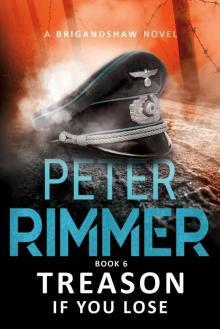 Treason if You Lose
Treason if You Lose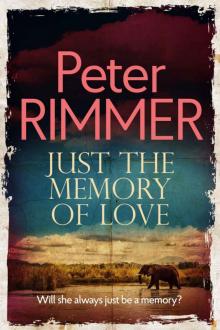 Just the Memory of Love
Just the Memory of Love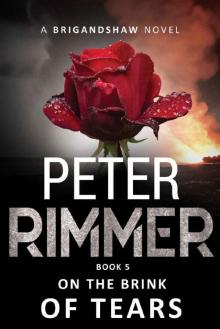 On the Brink of Tears
On the Brink of Tears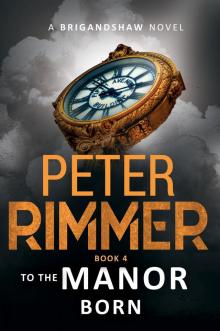 To the Manor Born
To the Manor Born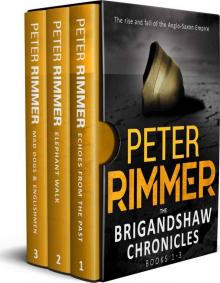 The Brigandshaw Chronicles Box Set
The Brigandshaw Chronicles Box Set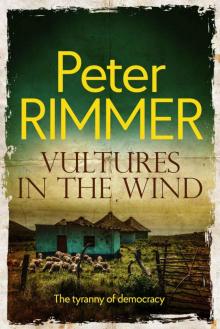 Vultures in the Wind
Vultures in the Wind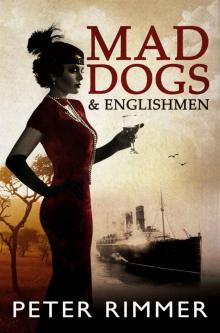 Mad Dogs and Englishmen (The Brigandshaw Chronicles Book 3)
Mad Dogs and Englishmen (The Brigandshaw Chronicles Book 3)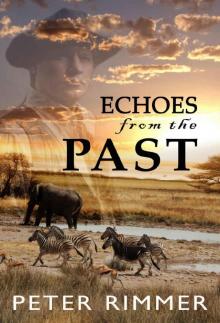 Echoes from the Past (The Brigandshaw Chronicles Book 1)
Echoes from the Past (The Brigandshaw Chronicles Book 1)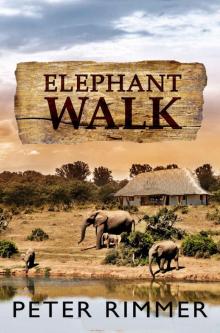 Elephant Walk (The Brigandshaw Chronicles Book 2)
Elephant Walk (The Brigandshaw Chronicles Book 2)